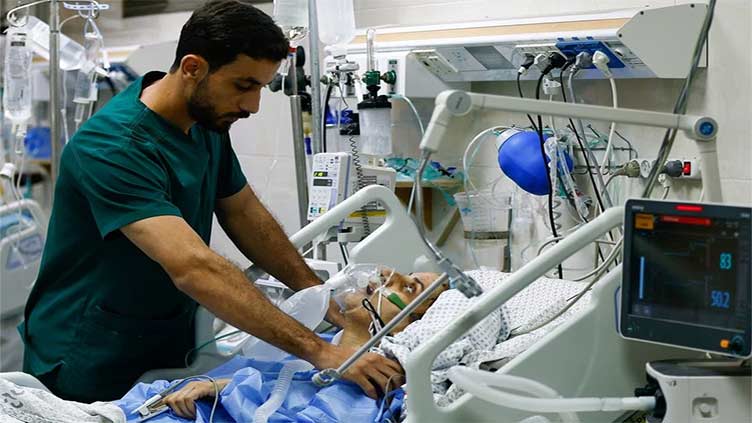Bodies line Gaza hospital wall and surgeons operate in corridors

World
The hospital had already been struggling under an influx of patients badly wounded by Israel bombing
GAZA (Reuters) – Dozens of bodies lay shrouded in white, lined up against the side of Gaza Strip's Indonesian Hospital on Tuesday from what health authorities in the Hamas-run enclave said was an Israeli airstrike on a Palestinian refugee camp.
The hospital had already been struggling under an influx of patients badly wounded by Israeli bombing, with medics setting up an operating room in a corridor because the main surgical theatres were full, they said.
Juggling dwindling supplies of medicines, power cuts and air or artillery strikes that have shaken hospital buildings, surgeons in Gaza work night and day trying to save a constant stream of patients.
"We take it an hour at a time because we don't know when we will be receiving patients. Several times we've had to set up surgical spaces in the corridors and even sometimes in the hospital waiting areas," said Dr. Mohammed al-Run.
He was speaking soon after a bombardment damaged the Indonesian Hospital near the frontlines of Israel's military thrust into the crowded Palestinian territory, and with a fuel supply for generators doctors say is about to run out.
Israeli tanks have entered Gaza, home to 2.3 million people, after three weeks of intense bombing of entire districts in response to an Oct. 7 attack by Hamas militants who killed 1,400 people in southern Israel and grabbed 240 hostages.
Health authorities in the Hamas-run strip say more than 8,500 people have been killed in Israel's assault, including 3,500 children.
In northern Gaza, where Israel has ordered a million people to leave their homes and head for the southern half of the enclave, which it is also bombing, hospital conditions have been especially tough.
Tuesday's blast at Jabalia, Gaza's largest refugee camp, killed 50 people and wounded 150 others, health authorities said. There was no immediate statement about the strike from Israel's military.
Footage of the aftermath in a video obtained by Reuters showed scores of people lining the side of a massive crater as they watched rescue efforts, part of a moonscape-like rubble in the camp.
Inside the hospital, bloodied patients lay on stretchers and trolleys and Dr. Suaib Idais said, "We have no idea what to do.... There are injured everywhere".
Officials at the Turkish Friendship Hospital said bombing overnight had damaged a ward treating cancer patients.
"The bombardment caused great damage and put some electro-mechanical systems out of work. It also endangered the lives of patients and medical teams," said Dr. Sobi Skaik, director of the hospital, the area's only cancer treatment facility.
POWER CUTS
Israel has blockaded Gaza, cutting off electricity, and refused to allow in fuel, saying it could be used by Hamas for military purposes. Hospitals have warned they may soon be unable to operate generators needed to maintain life-saving functions.
"In a few hours from now the power will cut due to the limited fuel available," said surgeon Moaeen al-Masry, adding this would lead to the deaths of patients in intensive care and surgical wards.
Gaza's Health Ministry spokesperson Ashraf al-Qidra said the main generators for both the Indonesian Hospital and for al-Shifa Hospital in Gaza City could be switched off late on Wednesday.
Israel's military spokesperson Lieutenant Colonel Jonathan Conricus said Hamas was hoarding fuel for its own operations. "There's enough for many days, for hospitals and water pumps to run," he said.
Last week, the Indonesian Hospital nearly ran out of fuel and had to cut electricity in much of the facility. After receiving some of Gaza's increasingly limited supplies, it is operating again, but remains near a total blackout, Masry said.
The Indonesian Hospital had about 250 patients on Tuesday morning before the Jabalia blast, Masry said. Because it is close to frontlines in northern Gaza, the hospital has received many of those caught in Israel's bombardment and advance, he said.
Since Israel expanded its ground operations in Gaza on Friday, the northern districts of Beit Lahiya and Beit Hanoun have been under especially heavy fire.
Footage obtained by Reuters showed Palestinians carrying bodies to the hospital on Tuesday on a donkey cart from Beit Hanoun.


